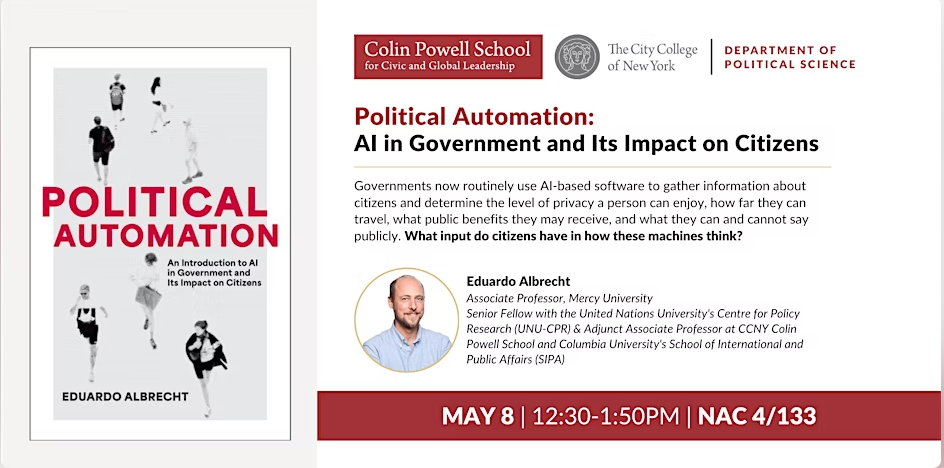Political Automation Book Launch at Colin Powell School for Civic & Global Leadership
Governments now routinely use Al-based software to gather information about citizens and determine the level of privacy a person can enjoy, how far they can travel, what public benefits they may receive, and what they can and cannot say publicly. What input do citizens have in how these machines think?
Book your free tickets at the link below for the launch of Political Automation: AI in Government and its Impact on Citizens at the Colin Powell School for Civic & Global Leadership on Thursday, May 8 · 12:30 - 1:50pm EDT.
Reboot Democracy Blog - Branching Out: A Third Legislative Chamber for the AI Age
The proliferation and collection of large amounts of citizens’ data has led to the rise of "political machines" – AI systems used in government to make decisions around resource allocation. Political anthropologist Eduardo Albrecht argues that establishing a "Third House" – a new legislative body specifically designed to oversee the deployment and operation of political machines – could enable citizens to meaningfully engage with and oversee the AI tools used by their government.
Read the full blog here.
John Cabot University Interview - Political Automation: Alumnus Eduardo Albrecht Publishes New Book on AI
JCU alumnus Eduardo Albrecht (class of 1999, International Affairs and History) has recently published his new book, titled Political Automation: An Introduction to AI in Government and Its Impact on Citizens (Oxford University Press, 2025), which investigates the increasing governmental use of AI and theorizes the changing role of citizens in policy making.
Read the full interview here.
AI in Government: A SIPA News Q&A with Political Anthropologist Eduardo Albrecht
In his new book, Political Automation: An Introduction to AI in Government and Its Impact on Citizens (Oxford University Press), Eduardo Albrecht, a SIPA professor and political anthropologist, examines how states deploy AI to make consequential decisions about their citizens. He proposes a revolutionary “Third House” of government—a virtual legislative chamber dedicated to AI oversight and governance.
Albrecht, who is also a senior fellow at the United Nations University’s Centre for Policy Research, draws on extensive fieldwork and ethnographic interviews with rights activists to document both the current state of algorithmic governance and emerging citizen responses.
In this SIPA News Q&A, Albrecht discusses the profound implications of AI-mediated governance, the risks of surrendering human judgment to automated systems, and his vision for preserving citizen agency through the creation of “digital citizens” who would represent citizens’ interests in an increasingly automated public sphere.
Read the full interview here



